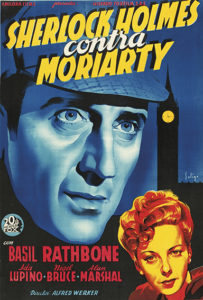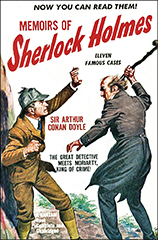WHAT SORT OF MAN WAS HOLMES?
 SHERLOCK HOLMES (b. 1854), a consulting detective, first appeared in A Study in Scarlet (1887), for which its author received £25. Holmes’s fame spread through short stories in The Strand Magazine, beginning with A Scandal in Bohemia in 1891. The oeuvre continued until 1927, spanning four books and 56 short stories, most narrated by Holmes’s friend and biographer Dr John H Watson, who shared lodgings with him at 221B Baker Street in London, where many of the stories begin. They were tended by the long-suffering housekeeper Mrs Hudson.
SHERLOCK HOLMES (b. 1854), a consulting detective, first appeared in A Study in Scarlet (1887), for which its author received £25. Holmes’s fame spread through short stories in The Strand Magazine, beginning with A Scandal in Bohemia in 1891. The oeuvre continued until 1927, spanning four books and 56 short stories, most narrated by Holmes’s friend and biographer Dr John H Watson, who shared lodgings with him at 221B Baker Street in London, where many of the stories begin. They were tended by the long-suffering housekeeper Mrs Hudson.
Holmes’s creator, Arthur Conan Doyle (1859-1930), an unsuccessful doctor, based Holmes partly on Edgar Allan Poe’s detective, Dupin, and partly on Joseph Bell, an Edinburgh forensic pathologist whom Conan Doyle had worked for as a clerk. Bell, however, wrote to the author – ‘You are yourself Sherlock Holmes and well you know it.’
HOLMES’S HABITS
 Was Holmes easy to live with? Watson (a former army surgeon wounded in Afghanistan) refers to Holmes’s ‘incredible untidiness, his addiction to music at strange hours, his occasional revolver practice within doors, his weird and often malodorous scientific experiments [which] made him the very worst tenant in London’ (His Last Bow, 1917). The mirthless image of Holmes was fixed by his illustrator Sidney Paget (1860-1908); in fact, Watson records Holmes laughing 65 times (and smiling 103 times). The Strand wanted Paget’s brother Walter but addressed the envelope to ‘Mr. Paget’ and Sidney opened it. He used his handsome brother as a model, a far cry from Doyle’s gaunt beaky original. Watson found Holmes’s ‘scraping at the fiddle’ irksome but he was actually a fine violinist, who loved Paganini. He smoked. Cigars, cigarettes and pipes, but never the curved calabash – that was an invention of the American actor-manager William Gillette to make his face more visible on stage. Holmes was moody. He bit his nails. He also had a cocaine habit. ‘Holmes, who loathed every form of society with his whole Bohemian soul [alternated] from week to week between cocaine and ambition, the drowsiness of the drug, and the fierce energy of his own keen nature’ (A Scandal in Bohemia). Above all, ‘his life was spent in one long effort to escape from the commonplaces of existence.’ He wore a ‘long grey travelling-cloak and his ear-flapped travelling cap’ (which Paget interpreted as a deer stalker). In private he wore a dressing gown. He was careless of his health – ‘I am a brain, Watson. The rest of me is a mere appendix.’ A polymath, he was the master of many subjects, from miracle plays to medieval pottery. He was a proficient fencer.
Was Holmes easy to live with? Watson (a former army surgeon wounded in Afghanistan) refers to Holmes’s ‘incredible untidiness, his addiction to music at strange hours, his occasional revolver practice within doors, his weird and often malodorous scientific experiments [which] made him the very worst tenant in London’ (His Last Bow, 1917). The mirthless image of Holmes was fixed by his illustrator Sidney Paget (1860-1908); in fact, Watson records Holmes laughing 65 times (and smiling 103 times). The Strand wanted Paget’s brother Walter but addressed the envelope to ‘Mr. Paget’ and Sidney opened it. He used his handsome brother as a model, a far cry from Doyle’s gaunt beaky original. Watson found Holmes’s ‘scraping at the fiddle’ irksome but he was actually a fine violinist, who loved Paganini. He smoked. Cigars, cigarettes and pipes, but never the curved calabash – that was an invention of the American actor-manager William Gillette to make his face more visible on stage. Holmes was moody. He bit his nails. He also had a cocaine habit. ‘Holmes, who loathed every form of society with his whole Bohemian soul [alternated] from week to week between cocaine and ambition, the drowsiness of the drug, and the fierce energy of his own keen nature’ (A Scandal in Bohemia). Above all, ‘his life was spent in one long effort to escape from the commonplaces of existence.’ He wore a ‘long grey travelling-cloak and his ear-flapped travelling cap’ (which Paget interpreted as a deer stalker). In private he wore a dressing gown. He was careless of his health – ‘I am a brain, Watson. The rest of me is a mere appendix.’ A polymath, he was the master of many subjects, from miracle plays to medieval pottery. He was a proficient fencer.
HOLMES AND WOMEN
‘Holmes had an aversion to women,’ wrote Watson. ‘All emotions, and [love] particularly, were abhorrent to his cold, precise but admirably balanced mind.’ Yet he had ‘when he liked, a peculiarly ingratiating way with women.’ In The Sign of Four (1890) Holmes said: ‘I should never marry myself, lest I bias my judgment.’ And anyway – ‘Women are never to be entirely trusted – not the best of them.’
Holmes’s fame It rests on his supreme deductive powers, his cryptanalysis and his mastery of disguise, be it drunken groom or venerable Italian priest. His method was ‘founded upon the observance of trifles’ (The Boscombe Valley Mystery, 1891). ‘You see, but you do not observe,’ he tells Watson (A Scandal in Bohemia). ‘When you have eliminated the impossible, whatever remains, however improbable, must be the truth’ (The Sign of Four). Without facts, he could presume nothing or imagine nothing: ‘Data! data! data! I can’t make bricks without clay’ (The Adventure of the Copper Beeches, 1892).
DEATH
In The Final Problem (1893) Conan Doyle, ‘overdosed’ on Holmes and eager to pursue ‘serious’ writing, killed him off (to the publisher’s horror, The Strand Magazine lost 20,000 readers) when Holmes and Moriarty, his arch enemy (‘the Napoleon of crime’), fell from the Reichenbach Falls. But in The Adventure of the Empty House (1903) Holmes reappears. He faked his death to fool his enemies. Holmes retired in 1902 to a farm on the South Downs in Sussex where he kept bees, studied philosophy and suffered from rheumatism. He has never died. He lives on in films and TV, the most portrayed fictional character ever, with over 25,000 stage adaptations. In WW2 Hollywood ‘weaponised’ him as a propaganda tool. He never said ‘Elementary, my dear Watson’ – a line from PG Wodehouse’s Psmith, Journalist (1915). But the reason for his fame is elementary. He was, said Watson, ‘the most perfect reasoning and observing machine that the world has seen’.


